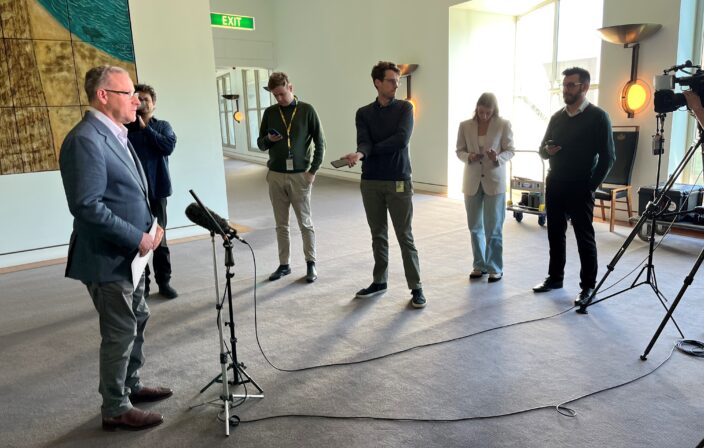Opening statement to the Fair Work Commission annual wage review hearing
17 May 2023
|Transcripts
Event: Opening statement to the Fair Work Commission annual wage review hearing.
Speaker: Peter Grist, principal economist, Australian Chamber of Commerce and Industry.
Date: 17 May 2023.
Topics: Award and minimum wages, inflation, wages growth, interest rates, business profits, productivity.
E&OE
As with recent reviews, the panel is again in an unenviable situation – facing a number of complex challenges, from slowing economic activity, high inflation, and continuing labour and skill shortages.
Now is not the time to be making bold decisions. ACCI stresses that genuine caution and moderation is warranted in setting the minimum and award minimum wages in this review.
I would like the opportunity to focus on three factors pertinent to the panel’s deliberation for this year’s annual wage review: inflation, business profits and productivity.
Inflation
There is an urgent need to get on top of inflation and quickly return it to the Reserve Bank’s target range of 2 to 3 per cent, so as not to extend the pain on Australian households and businesses any longer than is absolutely necessary.
The threat of inflation remaining elevated due to significant increases in wages has been highlighted by the Reserve Bank governor. In voicing his concerns about inflationary impacts of substantial wages growth, Dr Lowe noted a 3.5 per cent increase in wages was a good anchoring point. And: “… if wage increases become common in the 4 and 5 per cent range, it’s going to be harder to return inflation to 2.5 per cent”.
Therefore, it is important that a coordinated, whole-economy effort is made in returning inflation to the target band of 2 to 3 per cent.
Business profits
There has been much debate over corporate profits in recent months, but it is important to place this in context.
High global commodity prices stemming from the war in Ukraine have driven prices of iron ore, gas and coal to extraordinary highs, delivering the mining sector substantial profits in 2022.
Yet, it must be remembered that in the mining sector, only 1.1 per cent of the workforce is award-reliant. For this review, it is important to focus on the profits of industry sectors with a high share of award-reliant employees such as accommodation and food services, administrative and support services, and retail trade. In contrast to the mining sector, profits in these service industries have been low in recent years, severely impacted by the COVID-19 disruptions.
Businesses in these sectors have little capacity to absorb a significant wage increase without being forced to raise prices.
Further, many stakeholders have claimed that businesses are increasing their margins to achieve extraordinarily high profits, and this has been a core driver of the recent surge in inflation.
Yet, this is not consistent with the data. Analysis by the Reserve Bank, in the May 2023 Statement on Monetary Policy, includes a section that explicitly addresses the question: “Have Business Profits Contributed to Inflation?”
This shows that, outside the mining sector, profit growth – particularly in service industries which have a high share of award-reliant employees – has been weak over the past two years and remains below pre-COVID levels. There is little evidence of a broad-based increase in domestic non-mining profit margins in Australia. The Reserve Bank analysis concludes that business profits are not contributing to inflation.
Productivity
Increases in real wages can only be sustained if they are linked to gains in labour productivity.
The recent Productivity Commission 5-year Productivity Inquiry Report highlights that labour productivity has slowed considerably in recent decades. In the decade to 2020, average annual labour productivity growth in Australia was the slowest in 60 years, falling to just 1.1 per cent. This compares to an average of 1.8 per cent per year over the 60 years to 2020.
Labour productivity has slowed even further due to the COVID-19 disruptions over the past three years, to average less than 1 per cent per year.
While ACCI agrees that labour productivity growth should be shared between the business owner and the employee, current labour productivity growth, averaging less than 1 per cent per year, does not support strong growth in wages.
In this annual wage review, the panel must take note of the weak productivity growth and avoid decoupling wages growth from genuine productivity improvements. Given the weakness in labour productivity, an oversized increase in minimum and modern award wages cannot be justified.
ACCI’s position
ACCI supports a fair, reasonable and responsible increase in minimum and award minimum wages in 2023. We recognise that households are experiencing increasing pressures from high inflation. But it is impacting just as heavily on businesses by raising operating costs.
In making its decision, the expert panel needs to be aware of what is affordable and what is not. If the wage increase exceeds the moderate levels that balance what businesses can afford and community expectations, jobs and businesses will be lost.
ACCI supports an increase in minimum and modern award wages of up to 4 per cent (3.5 per cent plus the legislated 0.5 per cent increase in the Superannuation Guarantee) in 2023-24. We consider this to be both fair, reasonable and responsible in the current economic circumstances.
Our position is focused on containing inflation and returning it to the middle of Reserve Bank’s target range of 2 to 3 per cent as quickly as possible, as well as providing a reasonable allowance for workers to share the benefits of productivity growth, which as noted earlier is averaging less than 1 per cent per year.
We caution that any increase above 3.5 per cent plus the legislated 0.5 per cent superannuation guarantee increase would be irresponsible in the current economic environment.
Media contact:
Jack Quail | Media adviser
P | 02 6270 8020
E | media@acci.com.au


